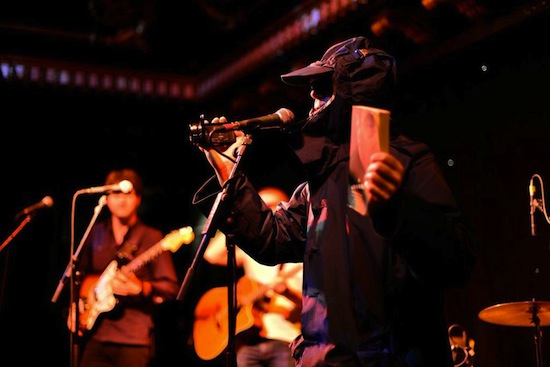Live shots courtesy of Gavin Fraser
When The Sexual Objects release their second album, Marshmallow, this week, this long-awaited follow-up to their 2010 debut, Cucumber, will be a singular experience bar none. Ever the conceptualists, the Edinburgh sired quintet led by Davy Henderson, a key figure in the Sound of Young Scotland ever since his first band, Fire Engines, announced themselves to the world in 1980 with the breathless fury of alt. muzak mini-album, Lubricate Your Living Room, will put out their new opus in a uniquely bespoke fashion.
While an accompanying set of instrumentals magnificently christened Cream Split Up and currently garnering airplay care of Marc Riley on BBC 6Music will be heard on 10” vinyl, Marshmallow will be let loose into the world in an edition of, well, you choose. Because, while the album is technically self-released on the SOBs own Eyelids In The Rain micro-label in conjunction with the Creeping Bent Organisation, as was their 2013 digital only single, ‘Feels With Me’, Henderson and co have opted to put a solitary vinyl edition of Marshmallow up for auction on eBay.
With the highest bidder also winning the rights to the recordings, they will subsequently be able to release as many or as few copies of Marshmallow as they like in whatever format they fancy. Or, if they wanted to be exclusive to the point of selfishness, they could simply hoard the tapes away in their metaphorical attic, with the split-screen sunshine-laden avant-pop appropriations contained therein never to be heard again except when the band play one of their glorious live shows.
"I had this idea when I was in Win," says Henderson of a concept that’s been percolating since he fronted his glossy 1980s pop combo. "Wouldn’t it be great to release one copy of an album so it’s like a painting? It becomes an object. I just thought it would be great to make an artefact like that, but because you’re signed to a major label that freaks them out. Whereas now, everybody can have a record label, the same way they can be in a band, so it’s an experiment as well, to find out and experience the mechanics of the whole process of putting out a record.
"It’s also about the fact that music’s become so valueless. You can buy two drinks and it’ll cost you a tenner, then you can go to Fopp and buy Vintage Violence by John Cale, one of the most beautiful, life-changing records you’ll ever hear, for three quid, and it will last you forever. Music is the most disposable, disrespected thing. Its almost like you’re scum. Its cheaper than a sandwich," Henderson drawls, "but not as heavy."
Henderson is perched on the corner of the stage of Edinburgh’s Voodoo Rooms club alongside SOBs drummer and long-term collaborator Iain Holford. A few hours later both men will be onstage alongside their fellow Objects, guitarists Simon Smeeton and Graham Wann,and bass player and head honcho of Creeping Bent, Douglas MacIntyre, opening up for Vic Godard & Subway Sect, who are performing one of their Northern Soul-tinged 1979 Now shows.
Then, Henderson will appear hoodied-up in shades and a Cheshire cat grin and announce himself as Martin Scorsese before filming the audience as he gets them to chant a celebratory "Marshmallow!" Just now, however, the stage is empty, with the odd passing waitress oblivious to the conspiracy unfolding beside them. It’s a conspiracy, it seems, which has been inspired in part by U2.
"I remember the Fire Engines playing with U2 in Valentino’s in Edinburgh," Henderson says of a 1981 club show with the future messiahs. "We were sound-checking, and Bono came in singing ‘Ave Maria.’ It’s interesting the radius that developed from out of that little pebble-drop, and the choices we made as a band and the choices they made, so now they’re an industrial corporation, who, by dropping five-hundred million copies of their album onto iTunes automatically, completely devalued their music to the level of it becoming spam. That’s not rock & roll. That’s fascism. So we’re actually doing something that’s more than polar opposite of what they’re doing. It’s not just the opposite. It’s like a black hole inversion."
In this sense, Henderson is the ultimate parallel universe pop/art star, whose back-pages have straddled several generations of post-punk glamorama, and without whom Franz Ferdinand wouldn’t have been able to cut the well-observed moves that made them famous. Franz Ferdinand are quite open about their musical debt to Fire Engines, and covered their song, ‘Get Up And Use Me’, on a split single with with a briefly reignited Engines, who played Franz’s ‘Jacqueline’ on the other side.
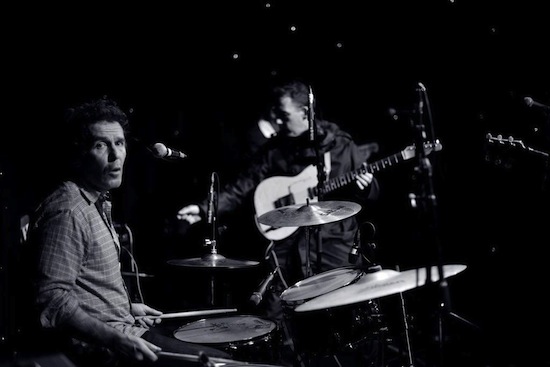
Henderson was sparked into musical life after he and pretty much anyone who went on to make the original Sound of Young Scotland witnessed Vic Godard’s Subway Sect and The Slits supporting The Clash on the Edinburgh leg of the 1977 White Riot tour. Henderson’s first outfit, Dirty Reds, eventually morphed into one of the most exhilarating bands around.
Even then Henderson dealt in concepts. ‘Fire Engines or Boredom – You Can’t Have Both’ declaimed the posters for a band who played fifteen-minute sets and took part in revolutionary theatre shows.
Fire Engines had developed in Edinburgh alongside Scars and others around Bob Last and Hilary Morrison’s Fast Product label, which was led by ideas and design as much as the music they were wrapped around. While Alan Horne wanted the band for Postcard Records, Fire Engines eventually released the primitive mood music of their only album, Lubricate Your Living Room, for Last’s post-Fast Pop:Aural operation. As with Fast Product, a critical flirtation with consumerism and packaging was essential to Pop:Aural’s modus operandi.
Fire Engines too flirted with the mainstream on string-laden single, ‘Candyskin’, a Peel session cover of Heaven 17’s ‘(We Don’t Need This) Fascist Groove Thang’ – before the Human League splinter group had released their debut single – and their 12” swan-song, ‘Big Gold Dream’.
This era is documented on the soon to be released The Sound of Young Scotland, a pair of feature-length documentaries which mixes up rarely-seen archive footage with new interviews with pretty much everyone who shaped the times, including a magnificently be-shaded Henderson.
Henderson attempted major label pop entryism with his next band, Win, whose glossily produced first single, ‘You’ve Got The Power’, soundtracked a 1980s TV lager ad, while two knowing albums never quite crossed over. He got back to basics with The Nectarine No.9, producing a plethora of low-slung three-guitar noir epics and lo-fi collages across a slew of albums spread throughout a decade that crossed into a new century.
It is the Nectarines final line-up that make up the core of The Sexual Objects, who serve up a brighter, loucher and altogether sassier – if equally skewed – take on post-punk&roll. Their single, ‘Here Come The Rubber Cops’, first released in 2008, was produced by Boards Of Canada, while on Cucumber, Prince, T Rex and Todd Rungren were all in the mix, as they have been, really, since Fire Engines days.
In the intervening four years since Cucumber, The SOBs forged an ongoing relationship with Vic Godard, with whom they frequently play (sometimes as The Sectual Objects). Henderson, meanwhile, appeared on Primal Scream’s 2013 album, More Light, playing on ‘Invisible City’ and ‘Turn Each Other Inside Out’ while sharing studio space with Sun Ra’s Arkestra, whose ‘Rocket No 9’ Henderson covered with the Nectarines. (Sun Ra, incidentally, used to release albums on his own El Saturn imprint in editions of no more than seventy-five, which would be sold at shows or by mail order or else distributed by hand.)
Live, The Sexual Objects have been on fire of late; covering Win’s ‘You’ve Got The Power’ to open their set; playing a Glasgow show with The Pop Group; ‘reconvening’ The Nectarine No 9 to play their dark 1995 masterpiece, Saint Jack – originally released on the briefly revived Postcard label – in full, to numerous shows with Godard. With the auction announced during this week’s Marc Riley session and more live shows pending, it is a happy accident that Marshmallow’s last day of sale will fall on January 25th, which is not only Burns Night, but thirty-four years to the day since Fire Engines and U2 shared a stage.
"The Sexual Objects was only meant to be a temporary thing for two years to do a bunch of singles that became Cucumber," Henderson says. "That was based on the idea of how classic sixties and seventies songs could recycle each other so they were almost exactly the same, the classic ones being The Kinks doing ‘You Really Got Me’ and ‘All Day And All Of The Night’.
"Then around the time of Davy Graham dying, I started finding out about detuning the guitar, and what you could do with that, and I also started listening to Cream, who I’d always resisted for years, but it’s this really free and anarchic pop. So Marshmallow is a guitar album, and it’s a pop album, and there’s that really American guitar playing, like the Beach Boys meets Rock And Roll Animal or something."
Henderson talks in abstracts about Marshmallow in terms of colour, and likens it to the vivid light-scapes of American artist James Turrell.
"It’s full of really saturated chords," says Henderson, before expressing a desire to perform the album at the centre of a room of living colour. "The record tries to emulate artists who use really saturated colours to create these unimagined landscapes. It’s a form of appropriation that tries to emulate colour sonically."
This writer has been privileged to have had a hand-packaged Cdr of Marshmallow in his possession ever since it was handed over in a Jiffy bag by Henderson one afternoon in Edinburgh’s Waverley Station as if it was contraband in some equally home-made espionage thriller. The cloak-and-dagger effect continued throughout numerous text message exchanges.
"Now’s the time to destroy yr. Compact Disc simulation of Marshmallow / Kultcream…" Henderson wrote in the gloriously idiosyncratic style that fuels his lyrics, "…for your own security please provide photographic evidence of defunct CD…"
Henderson’s Mission Impossible style missive was followed up with talk of a "technical Hitchcock" or else a teasing "ssshh!" and signed "William Franklin" in homage to the 1970s TV ads for Schweppes soft drinks.
As implied, the agreement then was that, as there was to only be one copy of Marshmallow in existence to be auctioned, this ‘advance’ bootleg was to be destroyed once the genuine article was put on the market. While hardly the K Foundation torching a million quid, Henderson’s instructions nevertheless smack of Gustav Metzger’s notions of auto-destructive art that went on to inspire Pete Townsend to smash his guitars in a calculated fit of Mod abandon.
In an age of built-in obsolescence, both my inner consumer and my inner collector are having trouble letting go of something so precious. At time of writing, the Cdr is still in one piece, but that will have to end soon.
Both the hand-crafted cardboard sleeve and the Cdr itself are covered in stickers on which track-listings are typed with what looks like was probably an old-school Remington or Olivetti, complete with Tippex-free crossings out. Two more stickers on the sleeve have faint pencil scrawls on them.
"Oh no!!" reads the first beneath the track-listing for side 1, "Life in tatters cos of the flippin’ Wu Tang Clan! What am I gonna do?"
The message continues on the other side, beneath the listings for side 2. "…someone help me, help me please!" it reads, then, just in case, "Donny Osmond, Puppy Love 1972."
The Wu Tang reference was inspired by the veteran hip hop collective’s 2014 release of compilation album, The Wu – One Night In Shaolin. Like Marshmallow, The Wu’s collection of unreleased material has not been released commercially, but in a silver-and-nickel boxed edition of one. The aim was to tour this as an objet d’art around galleries and festivals before being sold off, reputedly for millions, to the highest bidder.
In sound, at least, Marshmallow is equally priceless. Where Cucumber was a loosely knitted-together singles collection, Marshmallow feels richer, more fleshed out, and, as Henderson has hinted, wears its influences on its sunshine-dappled sleeve. While Cream Split Up features titles such as ‘Robert Quine’, ‘Ron Asheton’ (which comes with a video by original Jesus and Mary Chain bass player and long-term indie auteur Douglas Hart) and ‘Tel-Ray Collins’ (plus one named after BBC Radio 2 newsreader ‘Fenella Fudge’), a key song on Marshmallow is tellingly called ‘Kevin Ayers’.
With nine tracks split over two sides, the first (or Marshmallow) side features five songs, which are followed by a quartet of instrumentals on the flip (or Kultcream) side. Opener ‘Cincinnati Blooms’ sets the tone with an opening guitar salvo that grooves its way through a pre-punk rifferama married to 1970s synth swirls that eventually give way to lyrics that reference Davy Graham.
The following ‘Sometimes’ is equally knee-deep in knowingly 1970s Mick Ronson style sonic iconography that comes gift-wrapped with a warmth that permeates throughout the record. If there was any justice and these things mattered anymore, it would be a smash hit single. ‘I Get My Kicks/Nickin’ Licks/From Your Town’ is as telling as it gets, and is the perfect cue for ‘Kevin Ayers’, a suitably kooky confection that twists its way into a vocoder-led stratosphere.
The pace calms down for the title track, a piano and harmony led slow dance through some strung-out Lou Reed style melancholy that gives way to ‘The Shadow Of Jet Plane”s opening mediaeval style acoustic guitar refrain that name-checks doomed singer/songwriter Judee Sill before taking flight.
In marked contrast, the Kultcream side features four instrumentals. The first, ‘Astrastube’, is an exploratory set of guitar patterns that reflects back on themselves, while ‘Anglia Wagen’ is so darn wiggy it could be sound-tracking a psychedelic science-fiction beach party. It is the fifteen-minute sprawl of ‘Squash’, however, that forms Kultcream’s centrepiece.
As it swaggers into view, it inadvertently poaches the melody from Rod Stewart’s ‘Hot Legs’, only to take a woozy-assed detour more akin to the house band in the Big Bang Bar, featured in Twin Peaks: Fire Walk With Me on an even more out-there trip. Finally, ‘Pye Hill No.1’ (or ‘Leaflet’ according to Henderson’s home-made sleeve) is a brief sketch composed by Holford in which a vintage keyboard sounds transformed into a choir of angels trying to beam their way heavenwards.
It’s the perfect outro to what is possibly the most complete-sounding collection Henderson has made during his assorted musical adventures to date, and it would be a crying shame if no-one else got to hear it.
Of course, the release of both Marshmallow and Cream Split Up already look like something of a curse. Since they were recorded, former Cream bass player Jack Bruce has passed away. More recently, Bono from U2 has been in an accident which, he says, may prevent him from ever playing the guitar again.
Would-be collectors should pay no heed to such superstitious tittle-tattle, however. After all, if they do take a chance on Marshmallow, they will own 100% reproduction rights to the record forever. No review copies will be sent out.
"We don’t know what the outcome of this will be," Henderson admits. "It’s an experiment, and, like all experiments, it may fail, but that doesn’t matter."
Below, a glum Neil Cooper destroys his ultra-rare Cdr copy of Marshmallow. Photographs by Douglas Jones
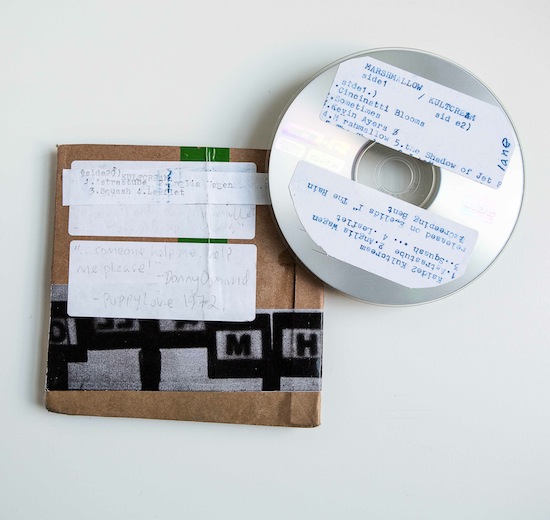
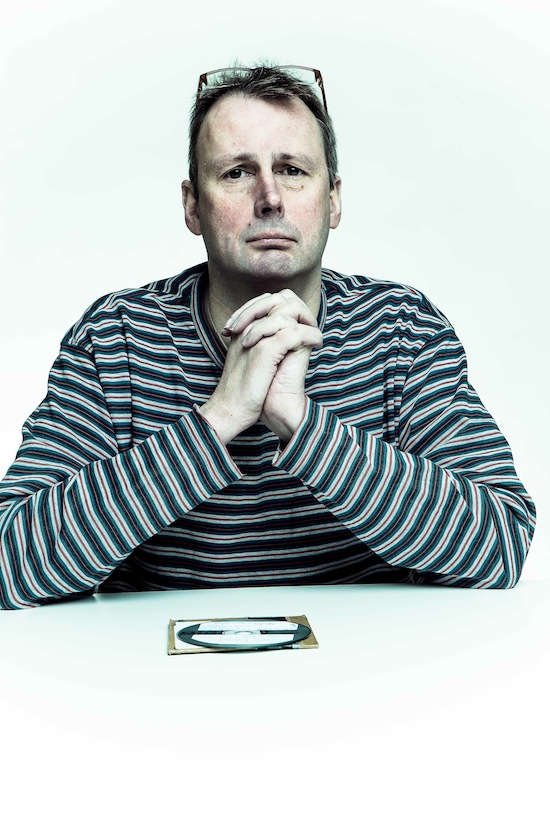
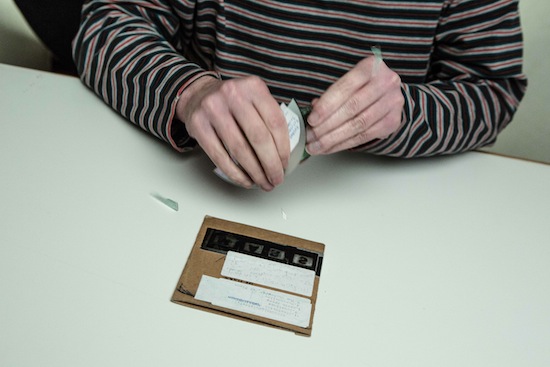
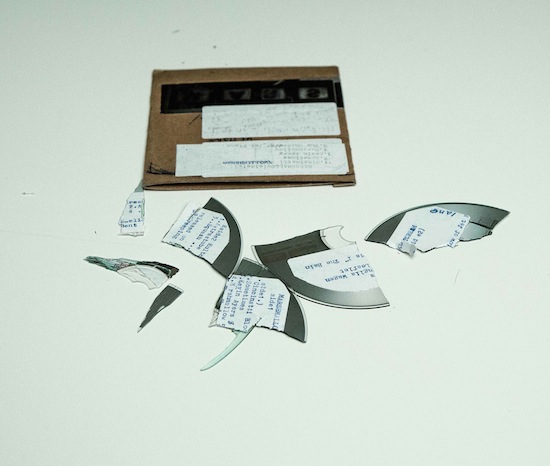
The Sexual Objects play Sneaky Pete’s, Edinburgh, as part of Independent Venue Week, on January 29, supported by Snide Rhythms. Marshmallow will be up for auction on eBay for ten days only from January 15-25

